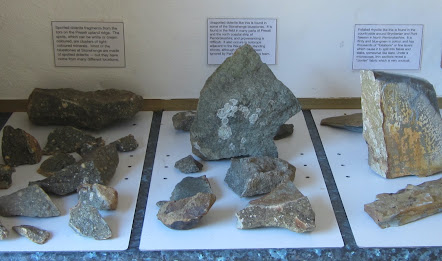It's been quite an education, welcoming people to my little Bluestone Museum and talking to them about what they believe and do not believe. One of the most striking things about the conversations is the number of people who have at some stage studied archaeology (including professional archaeologists) and who are seriously worried about the myth-making activities of certain senior professors. They cheer me on and say "Thank God somebody is highlighting some of our concerns." Then there is another group -- far larger -- of people who know nothing about archaeology or geomorphology and whose beliefs are based upon banner headlines in the press and on TV programmes introduced by our old friend Alice Roberts, among others. They are not stupid, and I prefer to think of them as intelligent people who are misinformed! Day after day I get statements like these:
"The geologists know exactly where all the bluestones at Stonehenge have come from."
"It's scientifically proved that there were bluestone quarries at Rhosyfelin and Carn Goedog."
"They now know exactly which route was followed by the people who moved the bluestones."
"They have found the precise places from which bluestone pillars were extracted in the quarries."
"At Waun Mawn they have found the exact sockets in which the Stonehenge bluestones once stood."
The words "exact" and "precise" come up over and again......
It's all nonsense, of course, but I have been surprised by just how influential that appalling programme involving Alice Roberts and MPP in the rain has been; it has been shown at least four times over the past 18 months, and those who know nothing about Stonehenge or archaeology think it's just wonderful! That probably makes Mike and Alice, and the BBC and English Heritage, very happy indeed.
But there is a darker side to all of this. Occasionally, and against my better judgment, I dip into discussions on Twitter or Facebook about bluestones and the prehistoric archaeology of West Wales, and when I seek to correct some of the misunderstandings some people are instantly enraged. Myths have turned into articles of faith, and they are accepted and followed with quasi-religious fervour by many thousands of people. As Magister Kurdling said to pupil Molesworth back in the 1500's: "Boy, take six of the best! How dare you seek to destroy the ignorance of a lifetime?"
Some people are so furious with me that they become very aggressive, and one or two "discussions" are turned very nasty by torrents of personal abuse pouring in my direction.
So we come to the cause of all this aggravation -- the promotion of rather wild fantasies and the creation of myths by archaeologists and geologists who should know better. They get cheap publicity and even something we might call "fame" because of the manner in which their ideas are promoted via press releases and the media and in TV documentaries promoting fantasies dressed up as the established truth.
Every now and again we see articles in the literature about "responsible archaeology", and indeed archaeologists are much more sensitive than they used to be about local cultures, languages and beliefs -- and about the ownership of artifacts. That is something to be applauded. But there is much less emphasis on the need for archaeologists to be careful and truthful, and to promote only those hypotheses that are well supported by field evidence. And hardly anybody talks about the need for academic restraint. When that restraint is abandoned, evidence is not properly scrutinized and "impact" becomes the only thing that matters. Both the media and the public are enticed away on a wild goose chase into territory that becomes more and more bizarre.
If there is one thing that upsets me it is the willingness of certain well-known archaeologists to announce earth-shattering finds (linked to Stonehenge, of course) based on the flimsiest of evidence, and to then spend years searching for, and even creating, confirmatory "evidence". Certain journals are complicit in this, publishing articles that should never have seen the light of day. And I am upset too by the manner in which inconvenient evidence relating to geology, landforms and sediments is simply ignored on the basis that the glacial hypothesis is "dead in the water." MPP and his team of maybe twenty researchers refuse even to admit that any of their ideas are disputed in the literature; that is not just bad manners, but a clear sign of academic malpractice.
When are archaeologists going to take this issue seriously and call out those responsible for this descent into the gutter? To continue with the metaphors, most academics appear to be scared to death of making ripples on the water or poking their heads above the parapet. But Gordon Barclay and Kenny Brophy have made a start by flagging up the "interpretative inflation" that goes with the aggrandization of Stonehenge, and to their credit they do not seem to be deterred by the vicious personal attacks that have been aimed at them by certain very angry individuals.
If archaeology is on the way out as a university discipline, it has only itself to blame.

2 comments:
I've been shouted at, too... Never wrestle with a pig – it gets mud all over you and the pig likes it.
I think I've decided to keep my mouth shut.
I suppose I could keep my mouth shut too. But what happens then, if there is no scrutiny at all of the research material pumped out at a phenomenal rate by the MPP team? What would have happened already if I had not happened to live close to the places (Waun Mawn, Rhosyfelin, Carn Goedog) that are the subjects of outrageous claims by both geologists and archaeologists? Their mythological narrative would all have been accepted as "the truth", and science would have been set back by a generation. Would there have been any self-correction? No way.
Post a Comment